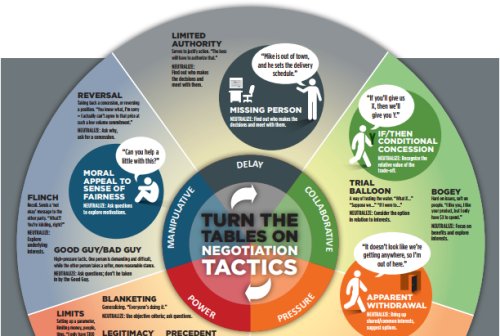When you negotiate, what role do you play during the negotiation? Do you give consideration to how your role is perceived, or the role your negotiation partner plays and how she wishes her role to be perceived?
This lesson examines the fifth of the five core emotions, which are appreciation, affiliation, autonomy, status, and role. All five components will usually manifest themselves during a negotiation.
When people negotiate, they play roles. The role may be one where by a person portrays a sterner or softer image than they normally cast. Nevertheless,you should recognize the role someone plays and acknowledge it for what it is.You don't have to necessarily acknowledge it verbally, but at least recognize and perceive it for what it is. Thats to say, you should be cognizant of the role your negotiation partner is projecting. At the same time, you should be aware of the role you're projecting and how its being perceived.
The reason it behooves you to be very aware of the role your partner is playing is the fact that he will give you insight into the negotiation mindset he's harboring. Question if he's playing the role of the innocent person caught in the middle that's trying to help you reach the goals of the negotiation, or if he's the impediment to reaching the goal. The former situation is akin to the car salesman that has to check with his manager to find out if the $3,000 deduction you've requested can be taken off the sticker price of the car you're trying to purchase.
While it's always a good negotiation strategy to never place yourself in the role of final decision maker, if you understand the role he's playing, you know what strategies to adopt in order to combat his tactics. In the situation where he's the impediment to reaching the goals of the negotiation, you can adopt a strategy that takes him out of that role by not playing along with him. In essence, you can ask to speak with someone that is more favorable to the negotiation, or point out that your perception of his actions is that of someone thats being obstinate.
When people negotiate they play games. By that I mean, most of the time, they will not fully disclose the overall intent of the outcome they seek from the negotiation. In reality, that's nothing more than good negotiating. But, you can gain additional leverage in the negotiation by paying attention to the role your negotiation partner cast herself in and use that leverage to your advantage. All you have to do is pay attention to her mindset, read her body language and her real demeanor will be revealed to you ... and everything will be right with the world.
The Negotiation Lessons Are...
- When you negotiate understand the importance that role plays in the negotiation. By understanding the role that's being played you gain insight into the mindset of your negotiation partner.
- You can gain additional insight into the role thats being projected by understanding the body language signals that are sent. Look at those signals closely and compare them to the words you hear. If the words and body language don't match, follow the body language.
- If you sense you're negotiation partner is projecting a role that doesn't suit your needs for the negotiation, adopt strategies to combat her position, or ask to deal with someone else.
